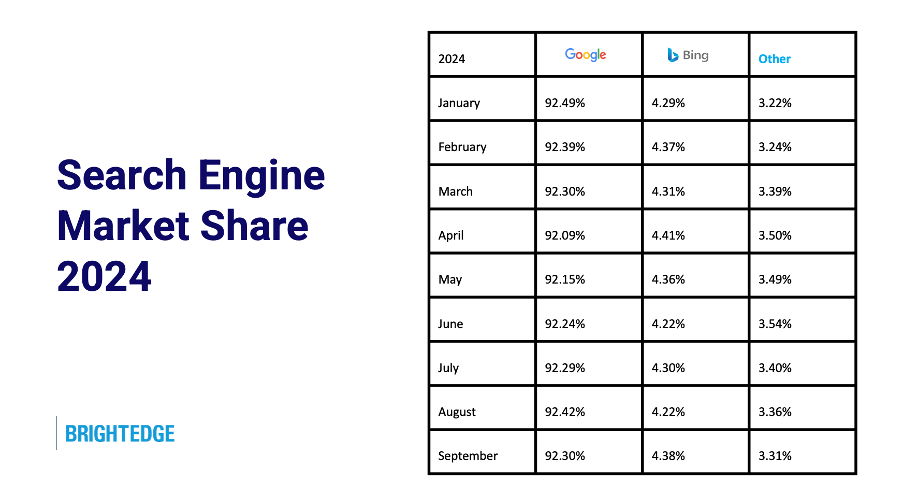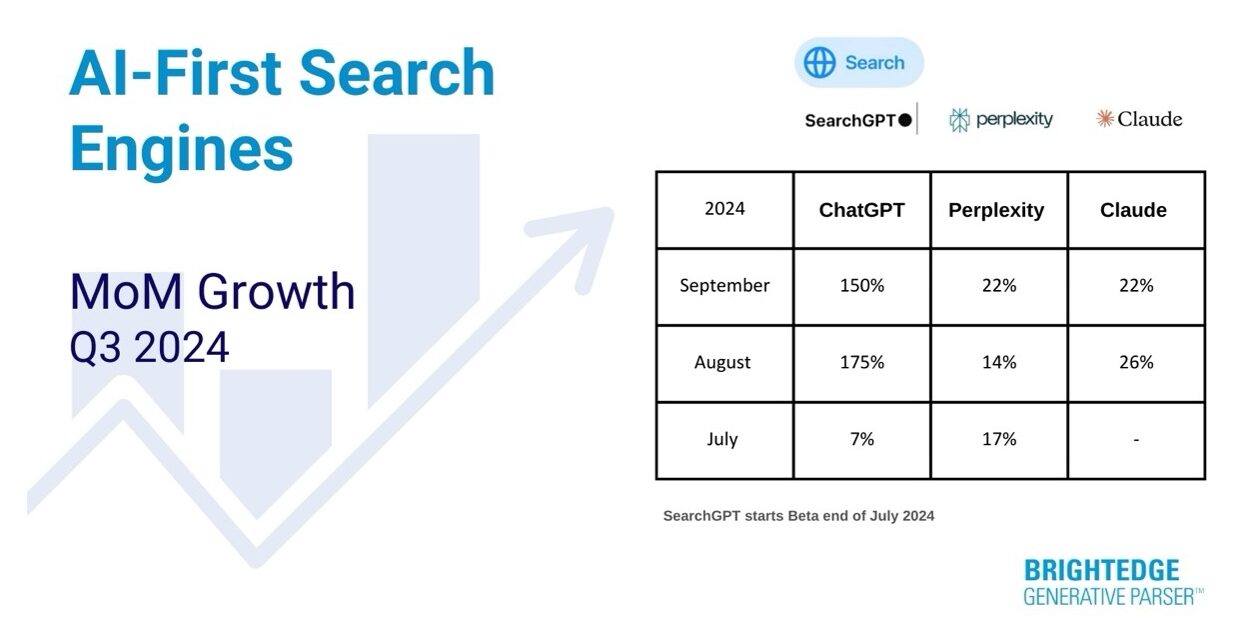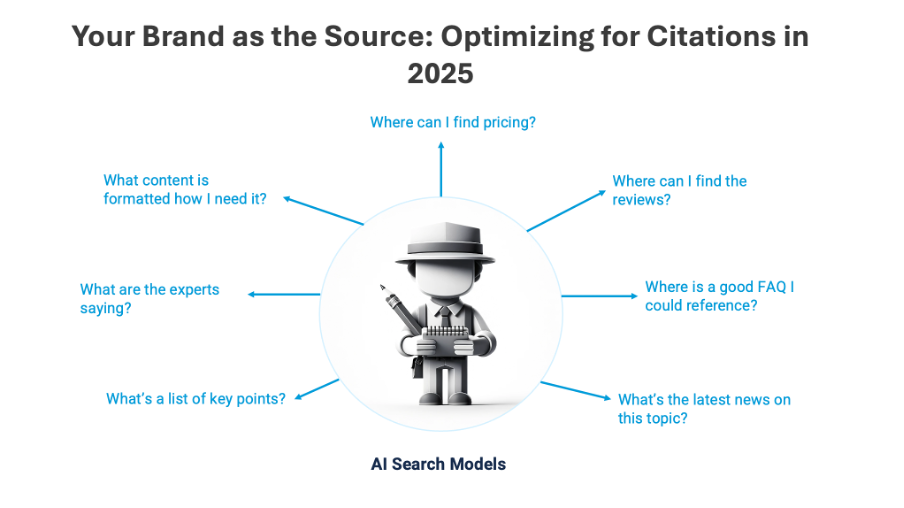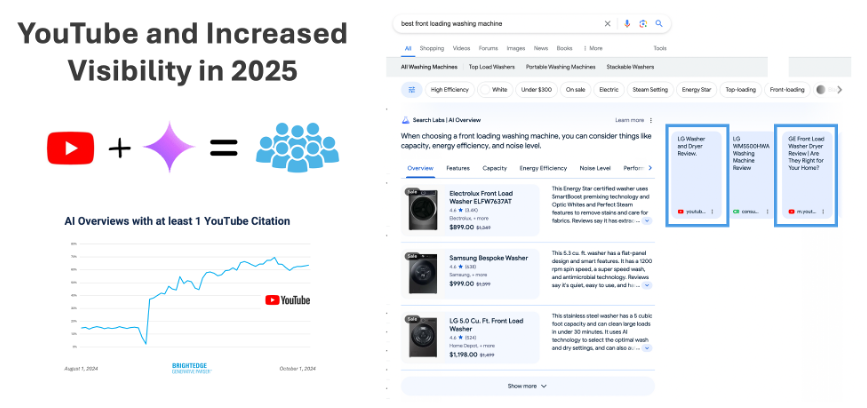Artificial intelligence isn’t just influencing search – it’s fundamentally reshaping how users discover information and how search engines deliver results.
This evolution presents extraordinary opportunities while adding more complexity for enterprise SEO organizations.
How Enterprise SEO Has Changed
Organizations are grappling with an environment where AI doesn’t just assist with search – it fundamentally shapes how every marketing function performs.
To accommodate so many new search developments and the integration of AI applications, almost every enterprise organization will, at some point, have to elevate, restructure, and integrate their SEO departments deeper within their marketing, creative, and branding teams.
Enterprise SEO is now pivotal to multiple channels and markets. Its integration with generative AI markets alone (not to mention content markets) means its total addressable market (TAM) grows.
The Evolution Of AI-First Search
The rapid progression of AI is redefining how organizations approach SEO.
Its integration into Google AI Overviews and the rise of new AI-first entrants like Perplexity and OpenAI’s ChatGPT Search have fundamentally shifted approaches from basic keyword matching to prioritizing user intent and delivering conversational, synthesized responses.
While Google remains dominant with 92% market share, new entrants are growing at a rapid rate, which is expected to accelerate in 2025 and potentially impact market share.
 Image from BrightEdge, November 2024
Image from BrightEdge, November 20241. Understanding New Search Behaviors: Information And Assistance
The way users interact with search has fundamentally transformed this year.
We’ve moved beyond simple keyword queries to complex, contextual interactions that span multiple formats and devices.
AI chatbots and generative AI are starting to impact search behavior as users expect search engines to understand their intent rather than just their words.
People are using AI chatbots to find answers to questions while others – like Generation Z – look to social platforms to search.
They are looking for conversations and new ways to interact in search.
Critical Changes In Search Patterns
Modern users are approaching search differently than ever before:
- Conversational Queries: Natural language searches have increased dramatically.
- Multi-Step Journeys: Users often conduct multiple related searches to achieve their goals.
- Cross-Device Behavior: The average user switches between three devices during a single search journey.
- Format Flexibility: Users freely mix text, voice, and visual search methods.
In addition, shifts from Google and AI engines will mean organizations have to pivot for some major changes ahead:
- Multiple platforms, from traditional search to AI-first answer engines and more.
- Multiple search formats (text, voice, visual).
- The integration of search and AI and video into multiple device types.
- Different user journey stages and journeys between engines and AI chatbots.
- New personalization requirements by engine, user preference, and use case.
2. The Expanding AI & Search Landscape: Shaping Enterprise SEO’s Future
We’re witnessing a fundamental shift from traditional keyword-based search to AI-powered discovery systems that understand and anticipate user needs.
Unlike traditional search engines, AI-driven platforms provide holistic interpretations of user queries, offering detailed answers and anticipating potential follow-up questions.
They are doing this in three ways:
- Generative Search Results: Search engines now routinely generate custom responses rather than just linking to existing content. This means enterprises need to optimize not just for visibility but for click value.
- Multimodal Search Integration: The ability to search using text, images, voice, and even video simultaneously is becoming standard. Enterprises must ensure their content is optimized for all these formats.
- Real-Time Content Analysis: AI engines can now analyze and understand content in real time, making freshness and authenticity more important than ever.
These shifts require enterprise SEO marketers to become more involved in creating authoritative, informative, and well-structured content to be found and cited by AI engines.
This also expands to entrants like You.com, Brave as a privacy engine, and Anthropic’s Claude.
And do not forget: social media platforms.
Many platforms, such as Meta, are building AI-powered search engines. In Meta’s case, it is building a search index to complement its Meta AI chatbot and rely less on Google.
As demographic understanding and targeting become essential, platforms like TikTok, Instagram, and Snap are prime for Gen Z searches and sources of information.
Learn More: The Rise Of TikTok As A Search Engine
Devices
Worldwide, wearable device shipments will reach 537.9 million units by the end of the year. This is another rapidly developing market for enterprise SEO professionals to consider.
The key to AR/VR, AI glasses, pins, and smart device success lies in consumer comfortability.
The AI and wearable trend is not just about the device or gadget. It’s about creating a symbiotic relationship between humans and new AI technology – another consideration for 2025.
Wider Big Tech Ecosystem Relationships
And let’s not forget that, while there is competition in search, there are also partnerships that enterprise SEO marketers need to keep an eye on.
Apple Intelligence and ChatGPT will be something to watch as AI and search reach more mobile devices.
Amazon and Anthropic are making strides, catering to enterprises with their computer-to-computer autonomous digital agent.
3. Understanding Different Engines And Different Use Cases
Marketers will face a diverse ecosystem where multiple AI-powered platforms serve different user needs and search intentions.
AI-driven engines like Google AIO, ChatGPT, and Perplexity have introduced diverse ways of searching for and consuming information.
Here are the three main ways for the purpose of this article.
 Image from BrightEdge, November 2024
Image from BrightEdge, November 2024Google AI Overviews
Google’s entry into this space with AI Overviews shows how traditional search is evolving.
These AI summaries appear at the top of search results, giving users quick insights while maintaining access to traditional search features.
AI Overviews summarize search results for users, often highlighting authoritative sources and presenting concise answers at the top of the search page.
- Functionality: Google’s AI Overviews provide AI-generated summaries at the top of search results, offering quick insights into products and trends.
- User Experience: Combines AI-generated summaries with traditional search results, providing users with comprehensive insights and direct links to various retailers and sources.
- Advantages: Google’s extensive search database, local business information, and real-time index.
Perplexity
Its strength lies in how it weaves citations directly into its answers, creating quick summaries that users can trust.
Think of it as having a research assistant who finds information and shows exactly where it came from. This makes it incredibly useful for comparing different sources and gathering reliable information quickly.
- Functionality: Perplexity AI is a conversational search engine that uses large language models to answer queries, generating answers using sources from the web and citing links within the text response.
- User Experience: Delivers concise, AI-generated summaries with citations, aiding users in quick comparisons and information gathering.
- Advantages: Efficient for obtaining summarized information with citations, making it easier for users to verify sources.
ChatGPT Search
Uses Bing’s live index to surface real-time results. It is now integrated into ChatGPT Search; its conversational approach and transparent citations allow users to find relevant, up-to-date information efficiently.
- Functionality: OpenAI’s ChatGPT Search integrates real-time web search capabilities into its AI chatbot, providing up-to-date information on products, prices, and availability.
- User Experience: A conversational response with direct links to sources facilitates an engaging user experience.
- Advantages: Provides personalized assistance and detailed product information, enhancing user decision-making.
Learn More: AI Agnostic Optimization: Content For Topical Authority And Citations
4. Maintaining Technical SEO While Building Content For Authority
While AI and new technologies continue to reshape the search landscape, the fundamental technical principles of SEO remain crucial for success.
Making Content AI-Readable
The foundation of effective AI optimization will lie in implementing robust structured data and schema markup.
These technical elements are a translation layer between your brand, content, and AI systems. With schema markup, you’re essentially providing AI engines with a roadmap to understand:
- Customer Q&As and help resources.
- Detailed product specifications and features.
- User feedback and testimonials.
- Content creator expertise and qualifications.
Building Digital Trust And Authority
Success in AI-powered search requires establishing strong content credibility.
Modern AI search platforms evaluate authority through multiple lenses – not just traditional metrics like backlinks but also information accuracy and source reliability.
Establishing Source Credibility
AI search engines place significant weight on content from verified, authoritative sources. This shift means content creators must focus on building and maintaining their reputation as trusted information providers.
 Image from BrightEdge, November 2024
Image from BrightEdge, November 2024Authority Building And Enterprise SEO
- Expert-Driven Content Development: Partner with subject matter specialists to create in-depth, authoritative content. Highlight the author’s expertise through detailed biographical information and credentials.
- Strategic Link Building: While the role of backlinks has evolved, they remain valuable trust signals. Focus on cultivating relationships that lead to natural link placement from respected industry websites and thought leaders.
- Platform Integration: Align your content strategy with established authorities in your field. Whether it’s academic institutions for educational content or recognized medical resources for health information, ensure your material complements and connects with these trusted platforms.
5. Mastering New Visual Formats: The Rise Of Multimodal Search
Text-based search is no longer the sole player in the field. Multimodal search, which combines text, voice, image, and video, will become standard practice.
BrightEdge observed a 121% increase in ecommerce-related YouTube citations for AI Overviews.
Due to the multimodal nature of generative AI, this means that the AI is capable of “watching” a video and using the content in it to help formulate an answer.
Unlike traditional search, where transcripts or metadata around a video are necessary to ensure rankings, AI can seamlessly pivot between video and text.
 Image by author (with sources from BrightEdge and Google Search), November 2024
Image by author (with sources from BrightEdge and Google Search), November 2024Enterprises must expand their SEO strategies to include diverse content types and ensure their assets are optimized for video, visual, and voice-activated searches.
Speak Your Audience’s Language
As voice-activated searching becomes mainstream, content needs to mirror natural conversation patterns.
Instead of focusing solely on traditional keyword optimization, craft content that answers questions the way people actually ask them.
Think about the difference between typing “best Italian restaurants in San Mateo” versus asking, “Where can I find authentic Italian food near me in San Mateo?” Your content should address both.
Create More Rich Media Experiences
Get visual with your storytelling and transform your SEO and content strategy by incorporating compelling visual elements that enhance user understanding:
- Professional photography.
- Custom graphics that explain complex concepts.
- Video demonstrations that showcase expertise.
Make Your Media AI-Friendly For Enterprise SEO Success
Help AI systems understand and properly index your multimedia content by:
- Implementing detailed technical markup for videos and images.
- Creating comprehensive media descriptions that provide context.
- Ensuring all media elements support and enhance your main message.
Enterprise SEO Focus On The Now And The Future
While Google still dominates, marketers should continue to focus on balancing traditional search and AI Overviews while optimizing for high-growth alternative engines.
While multiple legal trials and cases across the whole search and AI landscape take place, as marketers, we need to focus on the now while always preparing for pivots.
In 2025, Enterprise SEO professionals need to focus on:
- Managing enterprise SEO with all marketing disciplines – site-to-brand teams.
- Internal governance and alignment on the use of AI for SEO and content.
- Utilizing AI correctly for insights, creation, optimization, and scale automation.
- CEO and CMO stakeholder management and help guide and understand search and AI changes and their importance to your site(s) and brand performance.
- All to ensure your brand is cited and sourced as the authority in your domain regardless of the search or AI engine.
The complexity of modern enterprise SEO will demand a new organizational approach. Success requires seamless integration between SEO, content, technical teams, and AI specialists.
Monitoring, adapting, and growing are the three “keywords” to have a conversation around.
More resources:
Featured Image: tadamichi/Shutterstock
